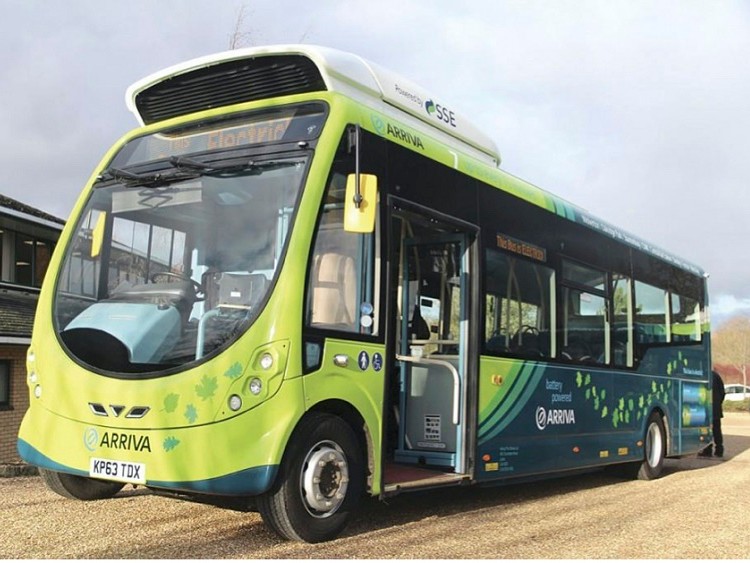Shropshire energy pioneer AceOn has won vital funding to play a key part in a groundbreaking scheme to bring old bus batteries back to life.
The Telford-based company has scooped more than £130,000 under the Sustainable Innovation Fund to trial new technology to make use of second hand batteries from electric buses.
AceOn has teamed up with Oxford-based specialists in power electronics and battery management systems Brill Power and Cranfield University in Bedfordshire for the project, which has won nearly £350,000 funding in total.
AceOn founder Mark Thompson said the company would use its expertise in manufacturing new lithium-ion batteries to upcycle eight used bus batteries to store solar power generated at the university. It is thought to be the first time in the UK bus batteries have been reconditioned in this way.
The company – which has more than 30 years’ experience at the cutting edge of battery technology – says the move could have huge commercial implications as well as showcasing its reputation for innovation.
Mark said: “Up-cycling lithium-ion batteries is challenging because they are so easy to damage when they are taken apart. This project is of national significance and really shows again how AceOn are at the forefront of renewable energy technology. We are renewable energy and battery specialists and this project is all about offering solutions today for tomorrow’s world.
“There can be large differences in the performance of old battery cells and conventional battery systems are only as strong and live as their weakest cells. There are also issues with the life-expectancy of recycled batteries.
“We have worked to overcome all these difficulties, built the know-how and expertise to remanufacture old batteries and laid the foundations for an effective supply chain.
“As a result we can use a novel battery management system (BMS) developed by Brill and our own technology to produce an upcycled battery which will have a maximal lifetime, performance and safety.”
The upcycled battery will allow Cranfield to store the power they generate from their solar panels to use when they need it, reducing their carbon footprint and helping reduce the impact on the environment.
“The technology both ourselves and Brill are bringing to the project is really innovative and could go on to play a huge part in our ability to combat climate change and develop highly-effective, sustainable and renewable energy supplies,” added Mark.
The pilot project will deliver a 120kWh second life lithium-ion battery system to store solar energy from a 20kWp installation. If successful, the technology will become commercially available with Cranfield University as a first customer for its 1MW PV array.
“The commercial possibilities for this technology are huge, but more important is the impact it could have on the country meeting its carbon neutral targets,” said Mark. “This funding is a massive step forward for us in developing a commercially-viable way of bringing old batteries back into real use. We are delighted to have won it and look forward to a successful outcome.”
Cranfield has a range of batteries available for the pilot project which formerly powered buses in Milton Keynes
The Sustainable Innovation Fund, delivered through Innovate UK, is a cornerstone of the £1.25 billion investment package announced by the Chancellor in April to help ambitious, innovative businesses survive and thrive during the current pandemic.
Executive Chair Innovate UK Dr Ian Campbell said: “Yet again we see the exciting range of business innovation taking place across the United Kingdom, despite these difficult times. Every initiative we’ve supported here represents an important step forward in sustainable economic development, but also one step nearer dreams becoming reality for ambitious hard-working company owners and their staff.”
AceOn Group boasts 30 years of experience in the battery industry and has a team of experts in battery design and manufacture. The company is one of the UK's leading providers of lithium-ion battery systems and has a diverse team of battery specialists, including mechanical and electrical engineers.
Pictured: The batteries were previously used to power buses
Public support helps firm secure finals place
Energy storage and battery pioneers want action
Fabweld Steel Products awarded more than £8,000
Firm boosts its environmentally-friendly reputation
Two-phase project will power local businesses
Chief executive, Network Telecom in Telford
Animal bedding range created
Construction project gets under way in Newport
Businesses urged to pitch for Flaxmill Maltings contract
Harper Adams University reveals plans for exciting collaboration
Students and staff celebrate awards success
£230,000 lifeline for Ironbridge Gorge Museum Trust
Initiative aims to help businesses plan their recovery
New UK director of marketing is appointed
Focus is on environment, digital and skills training